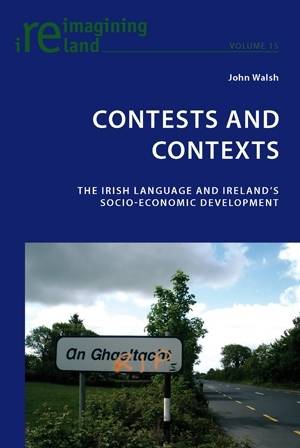
- Afhalen na 1 uur in een winkel met voorraad
- Gratis thuislevering in België vanaf € 30
- Ruim aanbod met 7 miljoen producten
- Afhalen na 1 uur in een winkel met voorraad
- Gratis thuislevering in België vanaf € 30
- Ruim aanbod met 7 miljoen producten
Zoeken
Contests and Contexts; The Irish Language and Ireland's Socio-Economic Development
The Irish Language and Ireland's Socio-Economic Development
John Walsh
€ 76,95
+ 153 punten
Omschrijving
Despite being Ireland's national and first official language, Irish is marginalised and threatened as a community language. The dominant discourse has long dismissed the Irish language as irrelevant or even an obstacle to Ireland's progress. This book critiques that discourse and contends that the promotion of Irish and sustainable socio-economic development are not mutually exclusive aims.
The author surveys historical and contemporary sources, particularly those used by the Irish historian J.J. Lee, and argues that the Irish language contributes positively to socio-economic development. He grounds this argument in theoretical perspectives from sociolinguistics, political economy and development theory, and suggests a new theoretical framework for understanding the relationship between language and development. The link between the Irish language and Ireland's socio-economic development is examined in a number of case studies, both within the traditional Irish-speaking Gaeltacht communities and in urban areas.
Following the spectacular collapse of the Irish economy in 2008, this critical challenge to the dominant discourse on development is a timely and thought-provoking study.
The author surveys historical and contemporary sources, particularly those used by the Irish historian J.J. Lee, and argues that the Irish language contributes positively to socio-economic development. He grounds this argument in theoretical perspectives from sociolinguistics, political economy and development theory, and suggests a new theoretical framework for understanding the relationship between language and development. The link between the Irish language and Ireland's socio-economic development is examined in a number of case studies, both within the traditional Irish-speaking Gaeltacht communities and in urban areas.
Following the spectacular collapse of the Irish economy in 2008, this critical challenge to the dominant discourse on development is a timely and thought-provoking study.
Specificaties
Betrokkenen
- Auteur(s):
- Uitgeverij:
Inhoud
- Aantal bladzijden:
- 474
- Taal:
- Engels
- Reeks:
- Reeksnummer:
- nr. 15
Eigenschappen
- Productcode (EAN):
- 9783039119141
- Verschijningsdatum:
- 23/11/2010
- Uitvoering:
- Paperback
- Formaat:
- Trade paperback (VS)
- Afmetingen:
- 152 mm x 229 mm
- Gewicht:
- 662 g

Alleen bij Standaard Boekhandel
+ 153 punten op je klantenkaart van Standaard Boekhandel
Beoordelingen
We publiceren alleen reviews die voldoen aan de voorwaarden voor reviews. Bekijk onze voorwaarden voor reviews.











